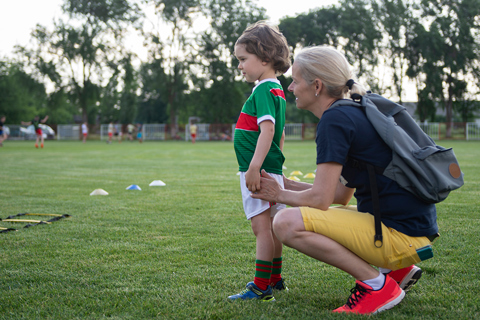Arranging extra-curricular activities that may infringe on the other parent’s time with the child

Frequently, as children are getting more and more busy with extra-curricular activities, we are asked for advice as to each parent’s right to make arrangements for a child to participate in a sporting or other activity. For example, one parent may choose to enrol the child in a sport team or ballet classes which require weekly attendance.
In this blog, we look at how this situation can lead to conflict around parenting arrangements and the Court’s view about applications to deal with such conflict.
Whether the child is part of a team or it is a solo activity, enrolment into an activity by one parent without the knowledge or consent of the other parent can ultimately lead to conflict between the parents about time spent with the child.
Extra-curricular activity clauses in parenting orders
Whether though the mediation process or if your matter is litigated in Court, both parents may seek parenting orders. Common approaches include:
- The parents are to do all such things to facilitate (insert child’s name) attendance at all extra-curricular activities to which they are enrolled.
- Prior to enrolling (insert child’s name) in any extra-curricular activity which interrupts the other parents time, the parent is to seek the consent of the other parent.
The second order, seeking consent of the other parent, can lead to the most conflict.
Reasons for conflict related to extra-curricular activities
When parents are separated, conflict around arrangements for extra-curricular activities for the children can include:
- Whether the child “needs” to participate in the activity;
- What are the expressed wishes of the child;
- What is the cost of the activity and who will pay for it?
- Prioritising activity chosen by one parent over the activity the other parent is seeking;
- The impact on each parent’s respective work schedule to attend upon said activity (or coordinate the child’s attendance);
- Commitment of training plus a game;
- The respective parent’s desires for the child to participate in something else.
Often, parents cannot agree on multiple factors above and it leads to conflict. If this conflict cannot be resolved amicably, for example through mediation, a parent may file an application for the Court to decide.
What is the Court’s view on parenting disputes related to extra-curricular activities?
The Court has been highly critical of parents who file applications over parenting disputes about extra-curricular activities.
In the case of Luchetti & Miller [2023] FedCFamC1F 38 (8 February 2023), Judge Carter was quite adamant that, in their view, the parents need to “sought it out”, and not use Court resources to determine such disputes.
The Court will frequently criticise parents for competing (between themselves) over matters rather than being child focused. The primary concern of separated parents should be to keep children away from any negative impacts of their parents’ separation.
The Court will be particularly critical of parents if a child seeks to participate in a team sport or other activity (particularly those over weekends) and one parent refuses to allow the child to attend games on a weekend allocated for them to spend time with the child.
Ultimately, the Court is reluctant to deal with such applications regarding children’s extra-curricular activities. If the Court is pressed to make a decision, then it is open to the Court to make a raft of orders, including that it may delete sole decision making for one parent for all matters.
Parties must engage (save for in exceptional circumstances) with Family Dispute Resolution prior to filing an application with the Court. An accredited Family Dispute Resolution Practitioner can assist in providing a number of helpful strategies to assist parents in reaching agreement. Ultimately, filing an application with the Court should be the last resort and filed with hesitation and acknowledgment of the risks of litigation.
As Judge Carter concluded:
It is, in my view, appalling that court resources have been taken up with this dispute. It should have been resolved between the parties. They are the only parents the children have, and they should start acting responsibly.
Can I attend my child’s sporting or other activity during the other parent’s time?
Ultimately, if all parents, extended family and new partners get along, then sure – parents can watch their children in the other parents’ time.
However, this is often rare.
It is important children can enjoy activities, such as sport and music, with their peers free from the conflict of their parents’ separation. When both parents attend an activity or event, and the child knows they are separated, it can (without intention) put your child in a position of conflict. For example, what happens in these scenarios?
- The child gets injured. Which parent helps?
- The child needs a drink. Which parent do they turn to for the drink bottle?
- Team mates are gathering at one house to celebrate. Which parent does the child seek permission from to attend or seek transport from?
If there is any underlying tension, save perhaps for grand finals or presentation day, we would say wait until it is your time with the child. This avoids your child being caught up in these difficult moments and indicates your commitment to a good co-parenting approach.
How can a family lawyer help?
Experienced family lawyers are regularly advising on issues such as arrangements for extra-curricular activities after separation. The nature of busy lives also means we are used to providing advice as to how to best manage the logistics of two homes.
You may wish to reach out to assist with negotiating with the other parent prior or attending Family Dispute Resolution, or to discuss a specific issue.
Our team at Meillon & Bright understands how important these issues can be for families, particularly for children. If you need any assistance, please get in touch.
Contacting Meillon & Bright
Family Lawyers Perth & Sydney
The information contained in this article is of general nature and should not be construed as legal advice. If you require further information, advice or assistance for your specific circumstances, please contact Meillon & Bright Family Lawyers.

